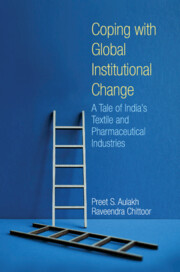Book contents
- Frontmatter
- Dedication
- Contents
- List of Figures
- List of Tables
- List of Appendices
- Preface
- 1 Introduction: The Challenge of Global Institutional Change
- 2 Conceptual Foundations and an Organising Framework
- 3 National Policy Choices
- 4 Industry Evolution: Tale of Two Industries
- 5 Strategic Renewal and Firm-Level Responses
- 6 Conclusion: Implications for Theory and Policy
- Bibliography
- Index
Preface
Published online by Cambridge University Press: 11 June 2022
- Frontmatter
- Dedication
- Contents
- List of Figures
- List of Tables
- List of Appendices
- Preface
- 1 Introduction: The Challenge of Global Institutional Change
- 2 Conceptual Foundations and an Organising Framework
- 3 National Policy Choices
- 4 Industry Evolution: Tale of Two Industries
- 5 Strategic Renewal and Firm-Level Responses
- 6 Conclusion: Implications for Theory and Policy
- Bibliography
- Index
Summary
The last two decades of the twentieth century brought a remarkable consensus among the nations of the world in the way they conducted commerce. Erstwhile communist nations such as Russia and China as well as protectionist democracies such as India and Brazil, compelled by differing circumstances, have all embraced economic reforms and opened their borders for trade and foreign direct investment. The last word is not out on the overall effect of such liberalisation policies, with some countries like China dramatically benefitting from world trade and managing to lift millions of people out of poverty, while others (for example, in Latin America and Eastern Europe) severely affected with domestic players almost wiped out by foreign competition, and yet others like India positioned somewhere in between with some sectors benefitting from reforms and others losing out. But there was one critical factor that was common to all the firms located in these reforming nations—their business landscape has been dramatically transformed with the rules of the game in business radically redefined. How do firms from developing economies, saddled with resource deficiencies and underdeveloped institutions, cope with sweeping institutional changes triggered outside their country borders? This is the question that motivated the two of us to embark on a research programme for over fifteen years using the empirical context of Indian industries and firms with which we have been closely associated both as researchers and practitioners. This book is our best attempt to answer this question by taking a multi-level institutional perspective and drawing from the combined evidence of India's textile and pharmaceutical industries that have had varied results in successfully coping with global institutional changes initiated under the auspices of the World Trade Organization.
This book is dedicated to Dr Sougata Ray and Dr MB Sarkar, two phenomenal individuals who, during a chance meeting at one of the Academy of Management meetings around fifteen years ago, envisioned the necessity of collaborative research efforts between scholars located in India and abroad to study the growing participation of Indian organisations in global markets. Both of them pursued the realisation of this vision with tremendous energy, starting with a seminar at the Indian Institute of Management, Calcutta, during which we, the authors of this book, met for the first time.
Information
- Type
- Chapter
- Information
- Coping with Global Institutional ChangeA Tale of India's Textile and Pharmaceutical Industries, pp. xvii - xviiiPublisher: Cambridge University PressPrint publication year: 2022
